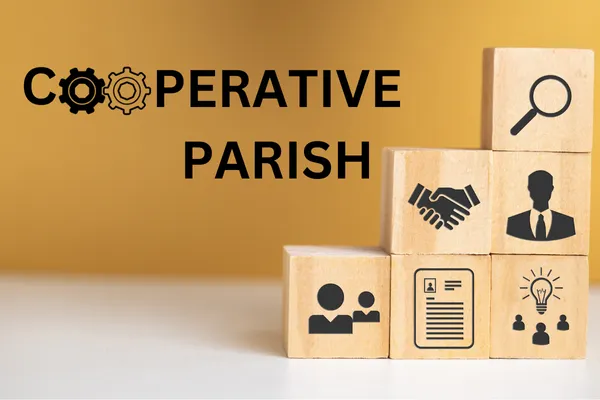
Revealing Top Struggles Shared by Every Cooperative Parish
A variety of judicatory leaders have reached out since the launch of our book, An Effective Approach to Cooperative Parishes: A Congregational Guide to Discernment and Implementation. Their questions are all of a similar nature. They want to know how to help existing churches in a cooperative parish adopt the practices described in the book. While implementing in existing cooperative parishes is not the recommended approach, I appreciate that judicatory leaders are seeking resources for churches. As a result, I have been coaching already established cooperative parishes through the process. Here are the top struggles shared with every cooperative parish and what I am experiencing and learning through these coaching cohorts:
As referenced in the title, the intention of the book is to assist churches in a guided process to discern if a cooperative parish model is a fit for their church before they become part of a cooperative parish. It’s a regrettable disadvantage for the pastor(s), church leaders, and the coach for churches to be placed in cooperative parishes without a clear understanding of the difference between a multi-point charge and a cooperative parish. Furthermore, not determining the type of cooperative parish upfront leads to further confusion, misinterpretation, and lack of direction and expectations.
It will take a considerable amount of time to build up trust if the churches in the cooperative parish don’t have already established relationships with each church involved. The leaders of the churches in the cooperative parish will need to have some vulnerable conversations and be transparent about their church’s current reality with one another in the process. It’s nearly impossible to have the conversations, let alone make any decisions if there aren’t relationships and trust built first.
The sense of fear is cavernous, but often unspoken. Early on if the fear is mentioned, it is presented incognito as pushback, denial, anger, frustration, lack of engagement, blame, sarcasm, and dismissal. It is helpful to bring the fear into the light, name it, and define it once the trust has been built. The fears include church closure, loss of church identity, change, increased financial obligation to the parish, loss of sacred (fill in the blank), and losing “control” of their church.
In most current practices, a church becomes part of a cooperative parish when pastoral compensation on their own is no longer financially viable. This is typically an indicator that the church is in decline and likely has been for quite some time. It would be helpful if churches were provided options like a cooperative parish when they were healthier and before it became a crisis. The church’s leadership bench is no longer deep due to the decline. Those that are leading are profoundly committed, fulfilling multiple roles, and often nearing burnout. These leaders need to quickly see some relief and hope without feeling disempowered. Again, if churches were caught earlier in their life cycle, the leadership bench would be stronger and deeper.
It will take an investment in time, commitment, and patience for everyone involved. The process can’t be rushed. Some topics will need to be covered multiple times or set aside until the leaders are ready to truly wrestle with the discernment, questions, and decisions.
The almighty dollar continues to be the largest sticking point in every cohort. One church has far greater wealth than the other churches in the cooperative parish. Often, it is the leadership of the wealthiest church who withholds financial transparency. The phrases such as “my money” or “our money” are often used. If the churches intend to cooperate in ministry, defining how the parish will financially cooperate upfront is critical. This is also a great opportunity to discuss how leaders are stewards of God’s money (not my money or your money) for Kingdom purposes (not sustaining or maintaining dying congregations or facilities).
Each coaching cohort has come to the conclusion that a covenant would be very helpful. Just like dating and premarital counseling are highly recommended before marriage, discernment and covenant are highly recommended before (or after if you find yourself already in one without having taken the steps before) a church becomes committed to a cooperative parish. The cooperative parish covenant would define the type of cooperative parish they have discerned they are or are becoming (see BOD ❡206) and how they will administratively (committees) structure their churches and the cooperative parish. The covenant will also include how they will specifically cooperate in ministry, staffing (paid and unpaid), finances, facilities (usage and maintenance), and worship. The covenant will also outline the expectations and commitment each church has of one another as a part of the cooperative parish.
These are some of the significant shifts, aha’s, and take-aways from leaders in existing cooperative parishes in the coaching cohort experience:
Churches in a cooperative parish will need to “stop thinking of only their church” and instead begin to think and plan for the cooperative parish.
Churches in a cooperative parish will need to reclaim their Wesleyan heritage and “become more lay-led.”
Churches in a cooperative parish will need to simplify structures or they will be “too top-heavy with committees” and spend too much time in meetings and not enough time in ministry.
Churches in a cooperative parish “may not be able to do all that they’ve always done” and maybe they shouldn’t. Being busy doesn’t always mean the church is being effective in its mission. Cooperating in a signature ministry and measuring its effectiveness will make better use of resources.
Churches in a cooperative parish “need to focus more on His call and less on the structural things of the church.”
One pastor described walking through this experience has landed the cooperative parish he leads at this “Lazareth moment. God has been calling us louder and louder out of the grave.” The pastor went on to explain that their cooperative parish may not yet be up and running out of the grave, but they are certainly now upright and sitting on the side of the bed.
One leader shared, “There is a spirit of hope for what we can be.”
Walking through the discernment and implementation towards a cooperative parish is not an easy process, but it is truly holy. I have been blessed to witness leaders struggle, grow, and stretch as they reimagine ministry as a cooperative parish – after they have become part of one. Whether your church finds itself in a similar situation or discerning the formation of a cooperative, here are some resources you might find helpful on your journey:
An Effective Approach to Cooperative Parishes
This congregational guide walks congregational leaders who are discerning a cooperative parish through a process of discernment. The step-by-step guide walks leaders through a detailed process. The guide includes checklists, leadership questions to process for greater understanding, the why behind each step, and an unfolding story of churches going through the process.
Gather a couple of leaders from each church along with your pastor(s) who are discerning the formation of a cooperative parish or are already in a cooperative parish to walk through the process outlined in the book, An Effective Approach to Cooperative Parishes, with professional certified coach and author, Kay Kotan. The leaders will first complete pre-work and then enter into a year-long coaching process to journey alongside leaders in the discernment and implementation process. Complete the interest form via the link above for more information.

